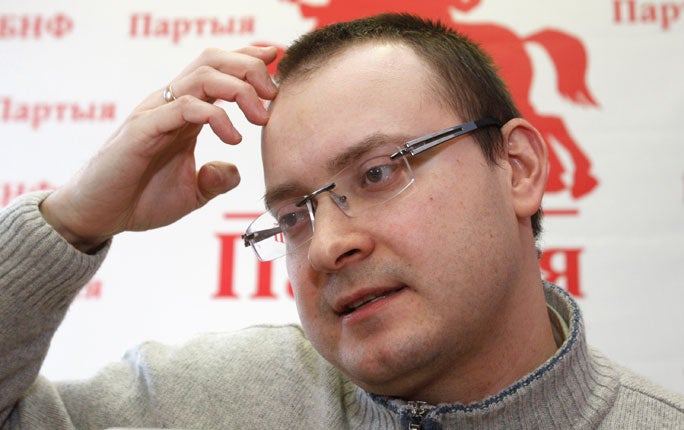President's rival tells of torture in Belarus jail

Your support helps us to tell the story
From reproductive rights to climate change to Big Tech, The Independent is on the ground when the story is developing. Whether it's investigating the financials of Elon Musk's pro-Trump PAC or producing our latest documentary, 'The A Word', which shines a light on the American women fighting for reproductive rights, we know how important it is to parse out the facts from the messaging.
At such a critical moment in US history, we need reporters on the ground. Your donation allows us to keep sending journalists to speak to both sides of the story.
The Independent is trusted by Americans across the entire political spectrum. And unlike many other quality news outlets, we choose not to lock Americans out of our reporting and analysis with paywalls. We believe quality journalism should be available to everyone, paid for by those who can afford it.
Your support makes all the difference.A prominent opposition politician in Belarus who was one of hundreds of people arrested after the disputed presidential elections last December said yesterday that he had been tortured inside a KGB prison.
Ales Mikhalevich was released by his captors on 19 February on the condition that he told nothing about his nine weeks in pre-trial detention. But the 36-year-old father of two appeared in public for the first time yesterday and, in an emotional press conference in Minsk, tore up the agreement he had signed stating that he wanted to tell the outside world about conditions inside the KGB prison where hundreds of pro-democracy campaigners are being held.
Mr Mikhalevich was one of seven presidential candidates who were arrested in the immediate aftermath of the December elections when Belarus' president Alexander Lukashenko initiated a widespread crackdown on any opposition inside the former Soviet republic.
Speaking about his time in jail Mr Mikhalevich said guards repeatedly made him stand outside naked in the cold, used excruciating stress positions during searches, forced him to sleep in a cell where the temperature was kept at 10C and refused him access to defence lawyers.
In one particularly brutal interrogation on 10 January, he claimed he was physically tortured by a group of masked men. "Some people wearing camouflage uniforms and face-masks, with no insignia, dragged me out [of my prison cell], handcuffed me behind my back and pulled my arms so high my face was hitting the concrete floor," he said. "They took me down a spiral staircase into a separate room and started pulling my arms up so high that my bones cracked, demanding that I promise to do whatever I was told to do by State Security officers. And they kept pulling my arms up until I said yes."
A spokesperson for the secret police, which still uses its pre-Soviet independence name, said Mr Mikhalevich's descriptions of conditions inside the jail "did not match reality". But his testimony adds to a growing body of evidence collected by human rights groups on what they say is as a vicious crackdown inside Europe's last dictatorship.
Mr Mikhalevich was not immediately available by phone yesterday but The Independent was able to contact his wife Milana. "My husband knows he could be rearrested immediately for speaking out but he feels he has to tell the world what is happening," she said. "The outside world must try to help in stopping such atrocities and torture in the heart of central Europe."
The crackdown in Belarus began on the night of the election as tens of thousands of pro-democracy activists descended on Minsk's Independence Square to protest at what they alleged was a rigged election. Official monitors have since said that the election fell far short of international standards.
Official figures state that at least 689 people, including seven presidential candidates, have been arrested in the last two months although human rights groups say the figure is much higher.
Most of the presidential candidates and their key helpers have been charged with organising a mass riot which carries a sentence of up to 15 years.
Mr Mikhalevich's allegations came as Ban Ki-moon accused Mr Lukashenko's regime of seriously breaching the international arms embargo on the Ivory Coast.
Mr Ban said Belarus had recently shipped three attack helicopters to disgraced president Laurent Gbagbo, who has refused to step down from power despite losing a presidential election in November.
Join our commenting forum
Join thought-provoking conversations, follow other Independent readers and see their replies
Comments